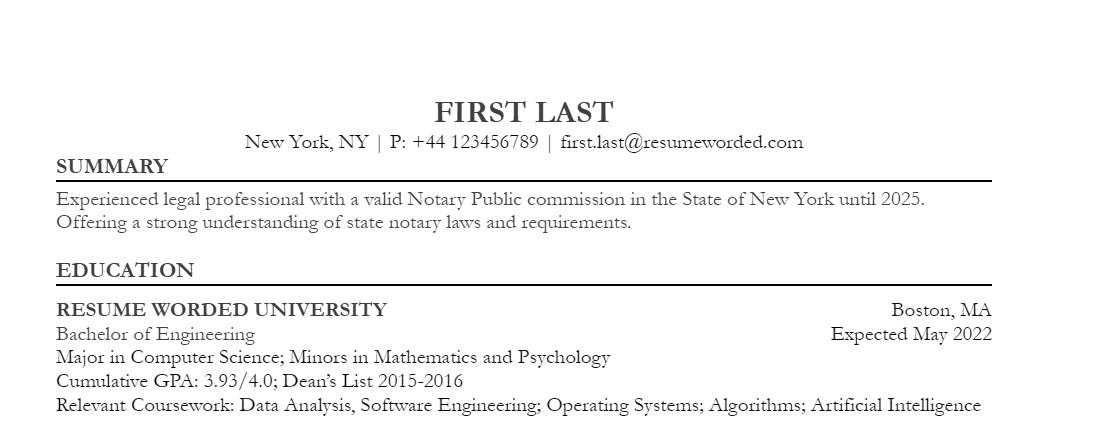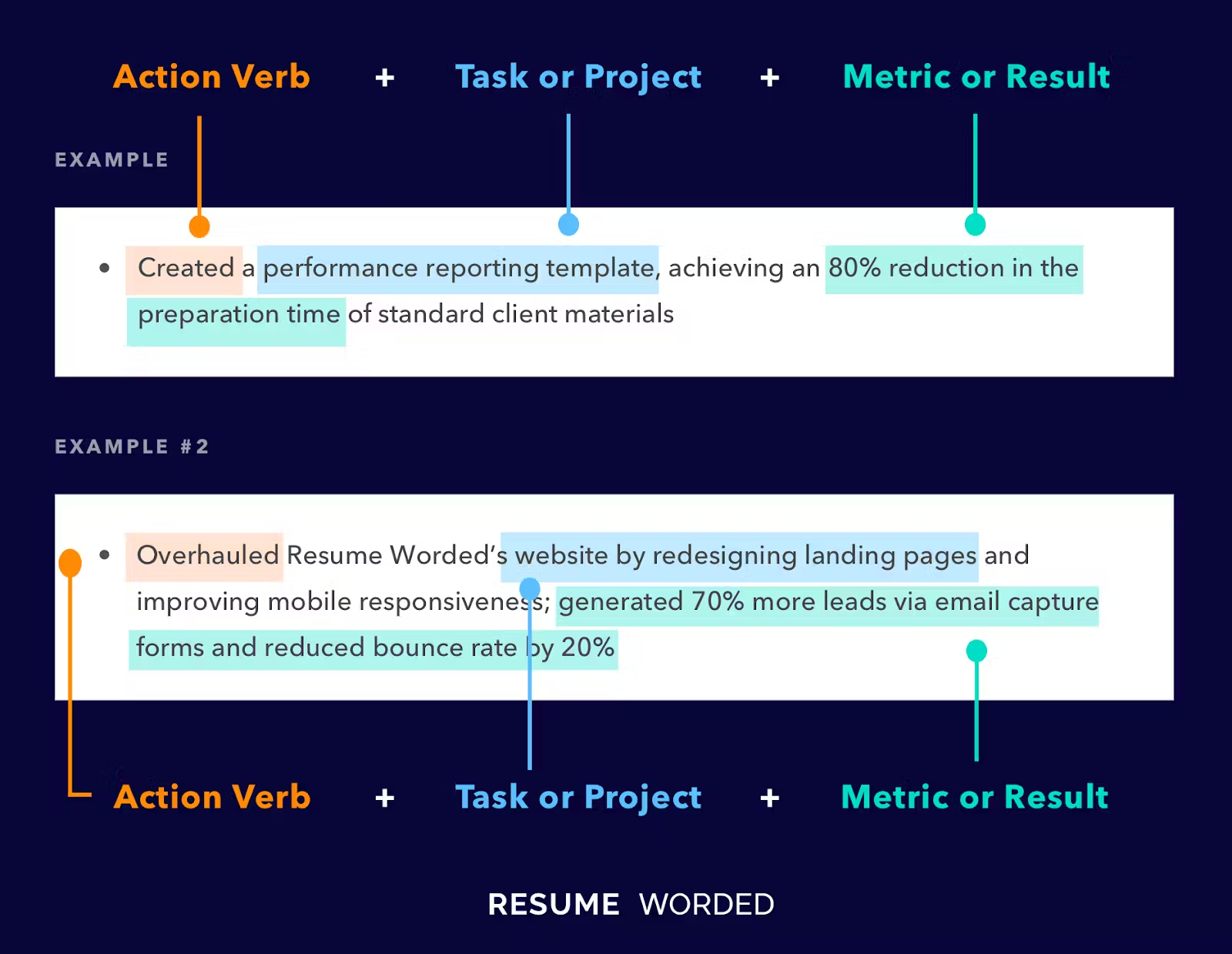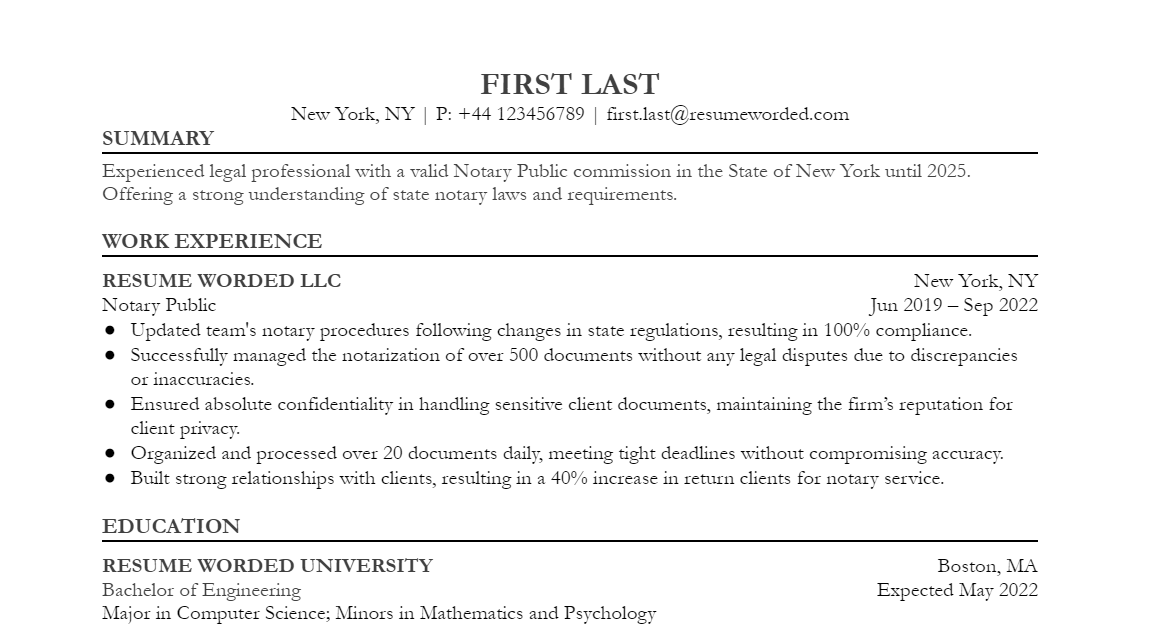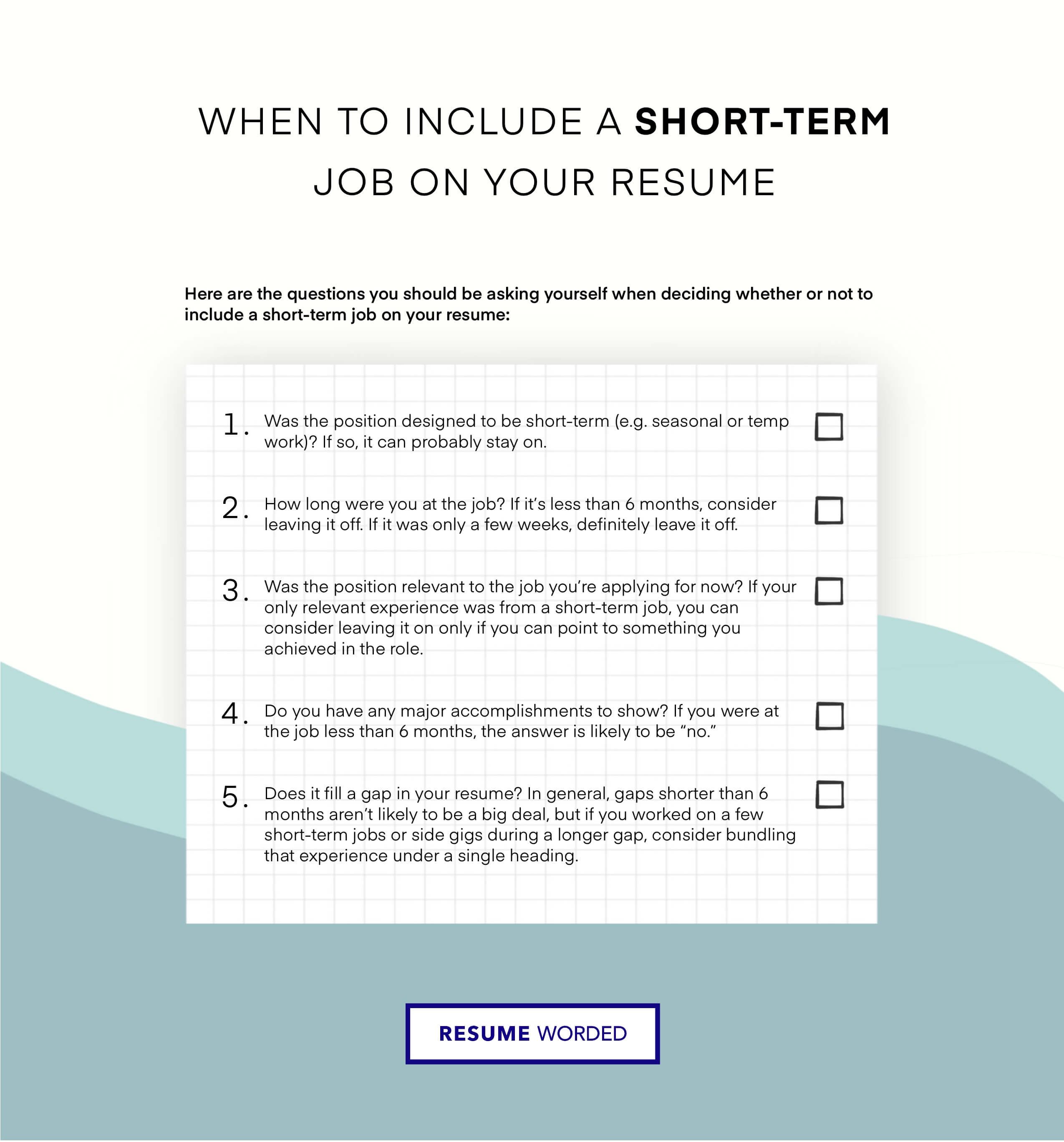Writing and updating your resume can seem a daunting task, but with the rise in remote notarization creating an even more competitive job market in 2025, it’s more important than ever to have a high-functioning professional notary resume.
This article will explain how and where to include your notary license on your resume, how to highlight your competitive transferable skills, and important keywords to include in any notary resume.
How to list notary on your resume
Listing your notary status on your resume is simple. Include your official title, the state or area where you are licensed to practice, and the expiration date of your license. For example:
Notary Public, California, valid until 2025.
Where to list notary on your resume
Your notary experience can be listed in multiple areas of your resume. Consider how relevant your notary status is for the position you are applying for to determine where and in how many sections to include your notary status.
Under certificates or licenses
The most common place to list your notary status is in your certificates and licenses section. List your status as noted above, including location and expiration date, and include any additional certificates, such as certified notary signing agent or eNotary.
As part of your work experience
If your status as a notary public is relevant to the position you are applying for, include it in your work experience section. List a brief overview of your notable achievements as a notary, and remember to focus on skills and accomplishments over roles and responsibilities.
Here is an example of how to include your notary experience as part of your previous work history:

If you’re not sure if your notary experience belongs on your resume, upload it to the tool below — it’ll scan it and give you personalized suggestions on what needs to be left off your resume.
Under skills
The skills section of your resume should focus on hard skills. Consider your technical notary skills, such as Microsoft Office or Adobe, and your experience with particular areas of law, such as corporate, real estate, or family law.
Soft skills, such as organization, attention to detail, and communication, should be demonstrated through the accomplishments and examples detailed in your work experience, not listed under skills.
Common notary keywords and skills include:
- Affidavit
- Legal Writing
- Legal Research
- Corporate Law
- Wills
- Property Law
- Escrow
- Real Estate Law
- Family Law
- Litigation
- Estate Planning
- Commercial Litigation
To find more keywords relevant to your application, scan the job description using our Keyword Finder, and include these words in your skills or work experience section.
You can also use the skills search tool below to get a list of skills and keywords relevant to the job you're applying for.
In your resume summary
If your notary status is directly relevant to your application, mention it in your resume summary to ensure a recruiter is aware of this detail up front. Include your license location and expiration date, and any standout accomplishments to write a powerful summary.
Here is an example of how to incorporate your notary experience into a resume summary.

How to highlight key skills on your notary resume
As mentioned above, your soft skills and experience should be demonstrated on your resume by listing specific achievements and accomplishments in your work experience section.
List 2-5 notable accomplishments per job, formatting your sentences in bullet points to make them easier to read. Construct your sentences using the standard power phrase format, combining a strong action verb with a task and quantifiable metric to demonstrate your skills and experience.
Here is a diagram of how to construct powerful bullet points to showcase your notary skills.

The following are examples of how to use the above formula to highlight specific notary skills.
Legal knowledge
To demonstrate legal knowledge and familiarity with local and provincial legislation, reference specific laws, procedures, or changes in regulation.
For example:
Updated team's notary procedures following changes in state regulations, resulting in 100% compliance.
Detail and accuracy
To show attention to detail and high levels of accuracy, mention the number of documents you were responsible for or specific projects that required detail-oriented skills.
For example:
Successfully managed the notarization of over 500 documents without any legal disputes due to discrepancies or inaccuracies.
Confidentiality
Mention confidentiality and experience handling sensitive information to show an understanding of its importance to the profession.
For example:
Ensured absolute confidentiality in handling sensitive client documents, maintaining the firm’s reputation for client privacy.
Organization and time management
Show organization and time management skills by referencing deadlines, large-scale projects, and complex workloads.
For example:
Organized and processed over 20 documents daily, meeting tight deadlines without compromising accuracy.
Customer and interpersonal skills
To demonstrate customer service and interpersonal skills, mention client relations, customer-facing projects, and the positive results of your work.
For example:
Built strong relationships with clients, resulting in a 40% increase in return clients for notary service.
Here is an example of how this would look on your finished resume.

Tips for writing a notary resume
Notary resumes, like any other professional resume, should be concise, targeted, and include only specifically relevant information. Here are a few more tips to boost the effectiveness of your resume.
Cut the jargon
Even if you’re applying for a notary or legal position, not everyone reading your resume will have a background in legal terminology. Cut any heavy legal jargon and explain acronyms or legal terms so your resume is understandable to recruiters and hiring managers without legal training.
For example, instead of stating that you “executed jurats and acknowledged instruments,” rephrase this sentence to say that you “verified and certified legal documents such as affidavits and deeds.”
Target your resume to each application
Target your resume to each individual application by including keywords and skills from the job description and highlighting only relevant work experience and qualifications.
Scan your resume using our Targeted Resume Tool to receive personalized feedback on how relevant your resume is to the application and key areas where you can improve.
Include notable projects
When creating power phrases and work experience bullet points, include notable projects and demonstrate your impact using quantifiable metrics. For example:
Standard statement: Worked as a notary at a law firm
Improved statement: Oversaw the notarization process for over 500 documents at a law firm, maintaining 100% accuracy and aiding in timely case resolution.
Tailor your resume for ATS
These days, many companies use Applicant Tracking Software to scan and filter resumes based on predetermined keyword criteria. To ensure your resume makes it past ATS filters, use an ATS-approved template when constructing your resume and scan your resume with an ATS scanner to ensure you have included the relevant keywords.
Optimize format and structure
Opt for an easy-to-read font and standard one or two-column format to make your resume easily scannable by recruiters and ATS software. Steer clear of fancy graphs, images, or complex layouts.
Keep your resume to one or two pages, and cut any lengthy paragraphs or outdated information. Focus on your most recent accomplishments (within the last ten years) and relevant transferable skills.










